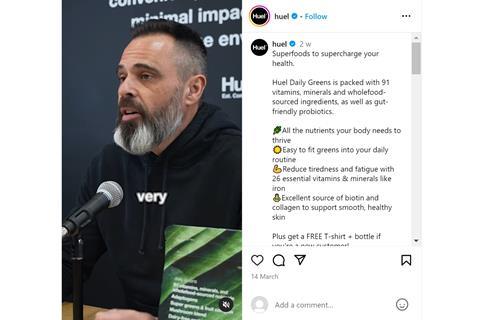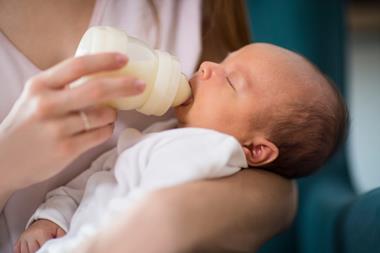
Huel has found itself in hot water with the ASA over health claims made by its founder Julian Hearn in a video posted on its Instagram.
In the post from March, Hearn was filmed stating Huel’s Daily Greens supplement was “equally good, or in my eyes better” than other “greens” whilst also being cheaper.
An accompanying caption made various health claims about Daily Greens, including that the product could “reduce tiredness and fatigue” and was an “excellent source of biotin and collagen to support smooth, healthy skin”.
A complainant challenged whether the comparison between “greens” and Huel’s Daily Greens was a comparative nutrition claim that complied with the CAP Code; whether the claim that the product was “substantially cheaper” than an equivalent portion of greens was misleading and could be substantiated; and if the general and specific health claims in the post complied with the Code.
Only nutrition claims authorised on the Great Britain nutrition and health claims register are permitted in marketing communications, and comparative nutrition claims must compare the difference in the claimed nutrient to a range of foods of the same category.
The ASA concluded consumers would understand Huel’s post as featuring comparisons between a supplement drink and “green vegetables”, products that did not fall into the same food category.
“We considered the claim “equally good or […] better” would be understood as an implied comparative nutrition claim that the Huel Daily Greens had just as much or more overall nutritional content as an equivalent portion of green vegetables,” a spokeswoman for the ASA said. “This wasn’t a permitted comparative nutrition claim and so breached the advertising code.”
The post also implied that the Daily Greens product was “substantially cheaper” than consuming a daily intake of fresh green vegetables, the ASA spokeswoman said.
“Huel didn’t provide us with any evidence showing this was the case, so we considered that the claim was misleading,” they added.
Huel also made several health claims that did not have the same meaning as any authorised health claims on the GB register, the watchdog ruled.
“The caption of the post made specific health claims in relation to ‘iron’ and ‘biotin’ which failed to meet the conditions of use set out in the ad codes,” said the spokeswoman. “The caption also made general health claims such as: ‘superfoods to supercharge your health’; ‘gut-friendly probiotics’ and ‘all the nutrients your body needs to thrive’, which were unaccompanied by a specific health claim and so were also in breach of the rules.”
Huel blames ‘editing error’ for health claim comparison
Huel, which declined to comment further when approached by The Grocer, told the ASA the original post had been shortened due to an editing error.
In the original full version of the post, the comparison was made with “the market-leading daily greens product”, it said. However, an error in editing had left the impression that the comparison was with fresh green vegetables. It recognised it had fallen short of the ASA’s standards in failing to substantiate its claims and said steps were being taken to ensure this was not repeated.
It said it believed it had accompanied the general health claims made with reference to specific authorised health claims, but acknowledged the claim “gut-friendly probiotics” had not been accompanied by the relevant authorised specific health claim.
It added it had taken steps to amend specific health claims in a compliant manner since previous engagement with the ASA.
It comes after Huel saw advertisements for its Daily Greens featuring an endorsement by Steven Bartlett banned by the ASA last month.
The watchdog said Huel had failed to disclose its commercial relationship with the Dragons’ Den star in two paid-for Facebook promotions.
The brand was also rapped by the ASA over “misleading” money-saving claims about its meal replacement products in February last year.



















No comments yet